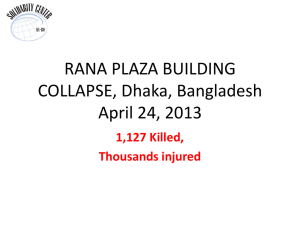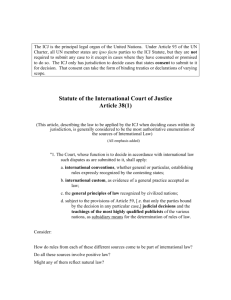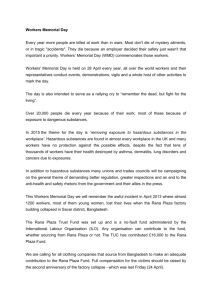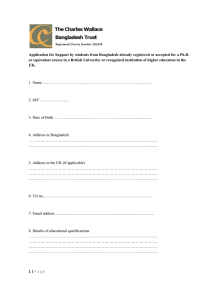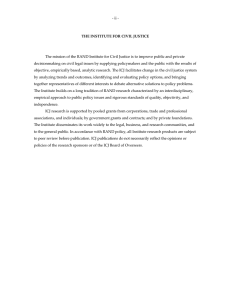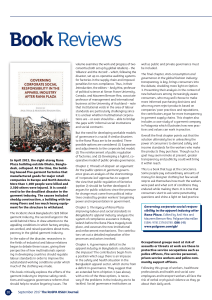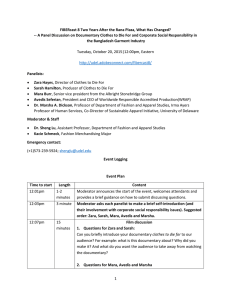Document 17705145
advertisement
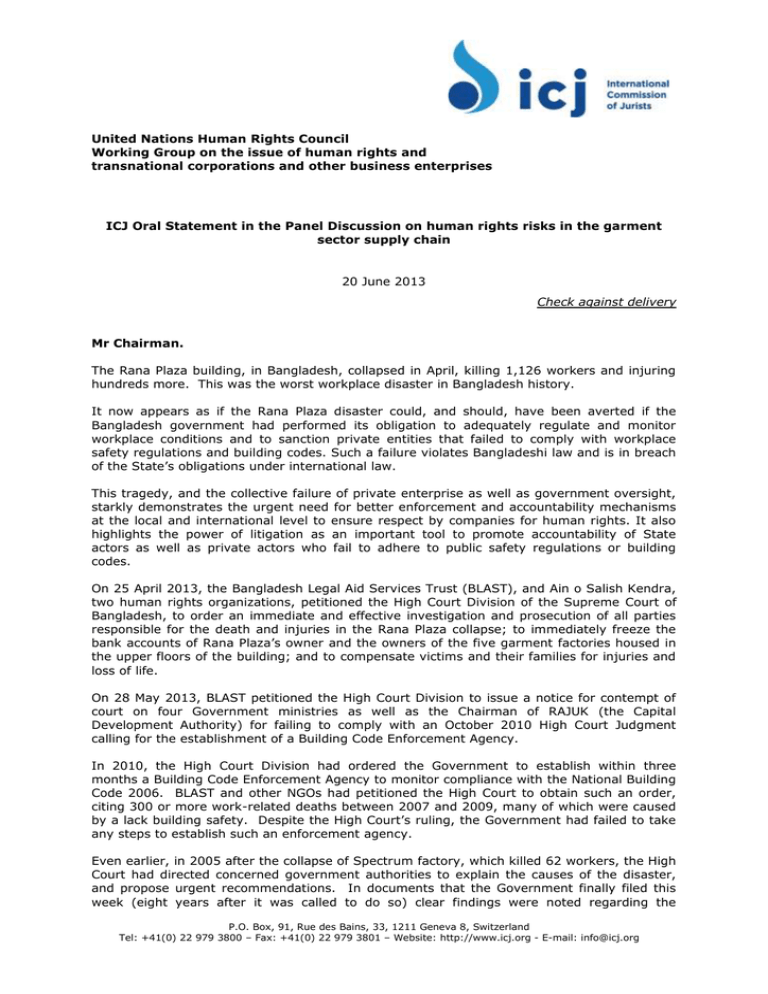
United Nations Human Rights Council Working Group on the issue of human rights and transnational corporations and other business enterprises ICJ Oral Statement in the Panel Discussion on human rights risks in the garment sector supply chain 20 June 2013 Check against delivery Mr Chairman. The Rana Plaza building, in Bangladesh, collapsed in April, killing 1,126 workers and injuring hundreds more. This was the worst workplace disaster in Bangladesh history. It now appears as if the Rana Plaza disaster could, and should, have been averted if the Bangladesh government had performed its obligation to adequately regulate and monitor workplace conditions and to sanction private entities that failed to comply with workplace safety regulations and building codes. Such a failure violates Bangladeshi law and is in breach of the State’s obligations under international law. This tragedy, and the collective failure of private enterprise as well as government oversight, starkly demonstrates the urgent need for better enforcement and accountability mechanisms at the local and international level to ensure respect by companies for human rights. It also highlights the power of litigation as an important tool to promote accountability of State actors as well as private actors who fail to adhere to public safety regulations or building codes. On 25 April 2013, the Bangladesh Legal Aid Services Trust (BLAST), and Ain o Salish Kendra, two human rights organizations, petitioned the High Court Division of the Supreme Court of Bangladesh, to order an immediate and effective investigation and prosecution of all parties responsible for the death and injuries in the Rana Plaza collapse; to immediately freeze the bank accounts of Rana Plaza’s owner and the owners of the five garment factories housed in the upper floors of the building; and to compensate victims and their families for injuries and loss of life. On 28 May 2013, BLAST petitioned the High Court Division to issue a notice for contempt of court on four Government ministries as well as the Chairman of RAJUK (the Capital Development Authority) for failing to comply with an October 2010 High Court Judgment calling for the establishment of a Building Code Enforcement Agency. In 2010, the High Court Division had ordered the Government to establish within three months a Building Code Enforcement Agency to monitor compliance with the National Building Code 2006. BLAST and other NGOs had petitioned the High Court to obtain such an order, citing 300 or more work-related deaths between 2007 and 2009, many of which were caused by a lack building safety. Despite the High Court’s ruling, the Government had failed to take any steps to establish such an enforcement agency. Even earlier, in 2005 after the collapse of Spectrum factory, which killed 62 workers, the High Court had directed concerned government authorities to explain the causes of the disaster, and propose urgent recommendations. In documents that the Government finally filed this week (eight years after it was called to do so) clear findings were noted regarding the P.O. Box, 91, Rue des Bains, 33, 1211 Geneva 8, Switzerland Tel: +41(0) 22 979 3800 – Fax: +41(0) 22 979 3801 – Website: http://www.icj.org - E-mail: info@icj.org existence of many hazardous buildings in the Savar area, and the need to establish urgently a task force to inspect these and take necessary action. Had Government agencies complied with the earlier orders of the High Court, and respected the law, the calamity of Rana plaza might well have been averted. The ICJ calls on the United Nations Working Group on the issue of Human Rights and Transnational Corporations and other business enterprises to: (a) Make a request to Bangladesh seeking an official visit to assess the State’s implementation of the UN tripartite “protect, respect and remedy” framework and the UN Guiding Principles; (b) Make recommendations to the Government of Bangladesh to enhance victims’ access to effective remedies and assist in the implementation of the framework and the UN Guiding Principles. I thank you. CONTACT: Carlos Lopez, ICJ Business and Human Rights, Senior Legal Advisor (Geneva), t:+41 (0) 22 979 3816 Sheila Varadan, ICJ South Asia Programme Legal Advisor (Bangkok), t: +66 (0) 857200723
